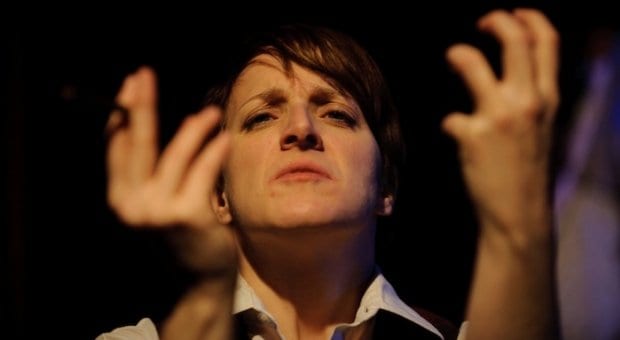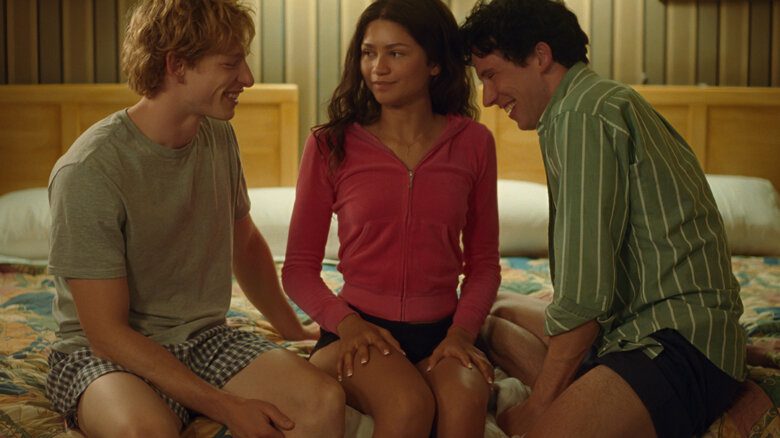This is a true story. This is a lost story.
So declares the promotional material for Margo MacDonald’s play Shadows, which describes the years between 1926 and 1935 in the life of Eva Le Gallienne, versatile theatre actress, producer and director and head of the Civic Repertory Theatre in New York City, a well-regarded company that employed dozens of women at all levels of its organization and that started the repertory theatre system in the United States, leading to the regional and off-Broadway theatre systems which are still used today.
Margo Macdonald jokes that her own legacy as a theatre creator will be one that covers what she calls “the lost lesbians.” For many artistic queer women, the impulse to document the past is borne of necessity: here, look at this incredible gem before it fades into obscurity again. How many of us have heard of a notorious Hollywood or arts-scene lez, dug around a little, found a treasure trove of behaviour that makes Oscar Wilde look like a Mormon and thought, “How the fuck did I not know about this woman?”
For all who have been enthralled by stories of Dorothy Arzner, Mercedes de Acosta, Alla Nazimova, Pola Negri, Greta Garbo — the sewing circles, as the semi-closeted and apparently orgiastic lesbian and bisexual communities of early Hollywood were known — it comes as no surprise.
Town Dyke sat down for coffee at The Common with Margo MacDonald, creator and star of Shadows, to chat about the play, which is up at Videofag until April 19.
Town Dyke: Margo, can you speak a little to this “How did I not know about this woman?” moment many women who do creative work that features lesbian/queer content have? What feelings does it evoke in you to come across yet another fascinating woman lost to history?
Margo Macdonald: I think we all are constantly seeking points of connection that let us know where we fit in the world and that we do, indeed, belong here; that we are not alone — never have been. When I stumble across yet another lost or hidden history of a woman who was queer — especially one who played a powerful role in history — I feel at first relieved. Relieved that they existed; relieved that I have found them. But I also almost always feel amazed and dumbfounded that the stories of these people could have been lost in the first place.
I used to work in a vintage clothing store way back when, and we had drawers full of old photographs, portraits of someone’s relatives, friends or lovers — thrown away, lost, forgotten. Looking in those drawers at all those blank, unnamed faces filled me with an uncomfortable sadness. How easy it is to be lost; how easy to be forgotten. It’s difficult not to feel some sort of responsibility to those whose stories we do come by.
Tell us a little about Eva Le Gallienne and what drew you to her particular history.
Partly, it was purely a matter of timing. I first stumbled across her at a vulnerable time, when I was first coming out — to myself, to the world. The fact that Eva was a successful theatre artist and an out lesbian instantly made me feel a connection to her. Her struggle with her sexuality and her art resonated. But the more I learned about her, the more fascinating she became, and I just knew I had to tell her story onstage. In spite of all her difficulties and failings, she was an amazing force in the world of theatre. Another fact I find rather amazing is that it is partly thanks to her influence following her accident [Le Gallienne was injured and disfigured in a gas explosion at her country home] that they started putting that rotten egg scent in gas so you’d be able to smell when there was a leak!
I actually had previously been working on a play about another lost queer woman — a swordfighter from 17th-century France, and since then have started collecting the names and brief histories of several others I’ve discovered or who’ve been pointed out to me.
I’m trying to think of what is different, in terms of “notorious” men whose histories and work have enjoyed a more consistent trajectory in and out of queer circles — Oscar Wilde, for example. I have a theory that because women’s sexualities are perceived as more “soft” and not maybe so “invasive,” they don’t hold as much interest to the dominant heterosexual culture as cautionary tales or salacious car-crash theatre. Do you think if women like Eva or Mercedes de Acosta were imprisoned for their actions there would be more interest cultivated around their histories? Thoughts?
That’s an interesting idea. I suppose if people like Eva or Mercedes, who were famous women in their day, had been arrested for their “scandalous” behaviour, the press would have had the same sort of field day with it as they did for Oscar. And, yes, that might mean they’d be more notorious today. But, you know, for the longest time, the common perception was that two women couldn’t really have sex, so there was nothing to really worry about. The only reason the press got around to “outing” Eva was because Josephine Hutchinson divorced her husband — the grandson of Alexander Graham Bell — to be with her, and it made a great story.
Eva herself said that in the 1920s and ’30s, it was fairly acceptable to be known for “lesbian behaviour” if you were an artist; that in fact, it was rather expected. But after the war, everything changed, and that fun-loving, playful attitude about it disappeared to be replaced in the public eye by concern over “family values” and “morals,” which then made being a known lesbian far more dangerous.
Artistic directors have been known to say that women’s work doesn’t sell. They must have the numbers (though I do stand on stages occasionally and look out at audiences and see a lot of women), so what do we do? Do you have any strategies to deal with this lack of programming?
Yes, one hears that all the time. I don’t really know what to make of that. Is it true? Or is it a self-fulfilling prophecy? Some of my all-time favourite playwrights are women — Caryl Churchill, Ann-Marie MacDonald, Linda Griffiths, Hannah Moscovitch, just to name a few — and I know I’m not alone in that. Right from the beginning of my career, over 20 years ago, I have made my own work when what I wanted to do just wasn’t around. So, I guess that’s my strategy — just keep making and producing the kind of work I want to see and hope that other people will want to see it, too.
Eva had a similar philosophy. She hired women designers, directors and playwrights at a time when very few theatres were doing so. Furthermore, she believed that everyone should be able to afford to see theatre and that they should be offered the best of work, no matter what price they paid to sit in the house. She left Broadway and started her own theatre company because she hated how on Broadway, theatre was business and not art. The motto of the Civic Repertory Company was “Theatre should be an instrument for giving, not a machinery for getting.”
Is the play’s name a nod to the period’s term “shadow actress,” meaning lesbian actress?
Yes, partly. It’s many-layered in its possible meanings, of course. But in the play, it’s talked about in terms of Bourdet’s The Captive, which at the time had only recently scandalized New York theatregoers and in which he calls the women who are in love with each other “shadow women.” After that, calling someone a “shadow actress” or saying, as the press did, that Jo was Eva’s “shadow,” was thinly veiled slang for saying they were a lesbian couple.
Shadows
Runs until Sat, April 19
Videofag, 187 Augusta Ave
videofag.com

 Why you can trust Xtra
Why you can trust Xtra


